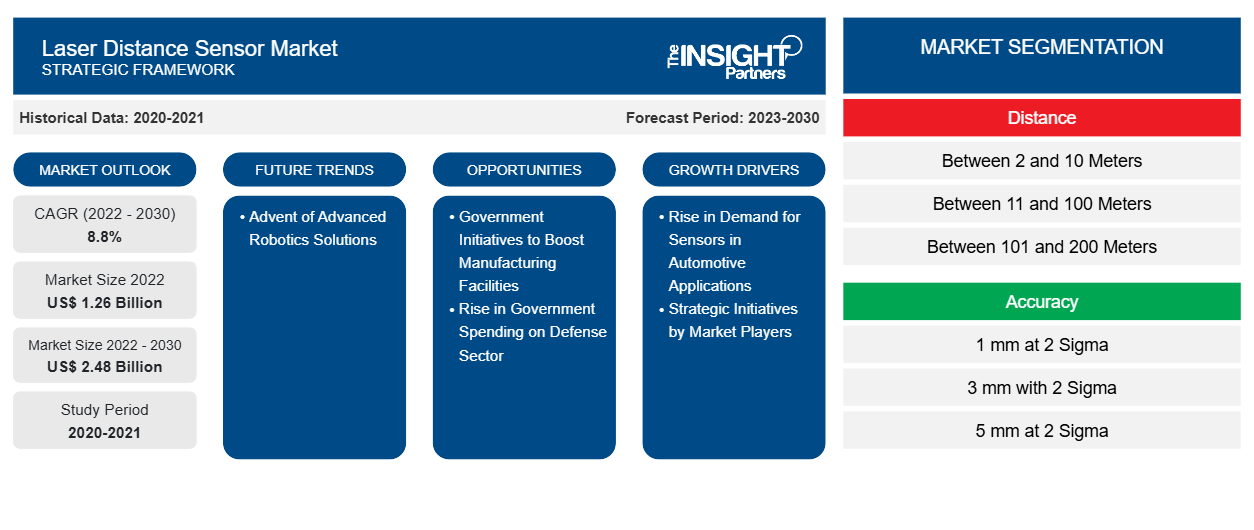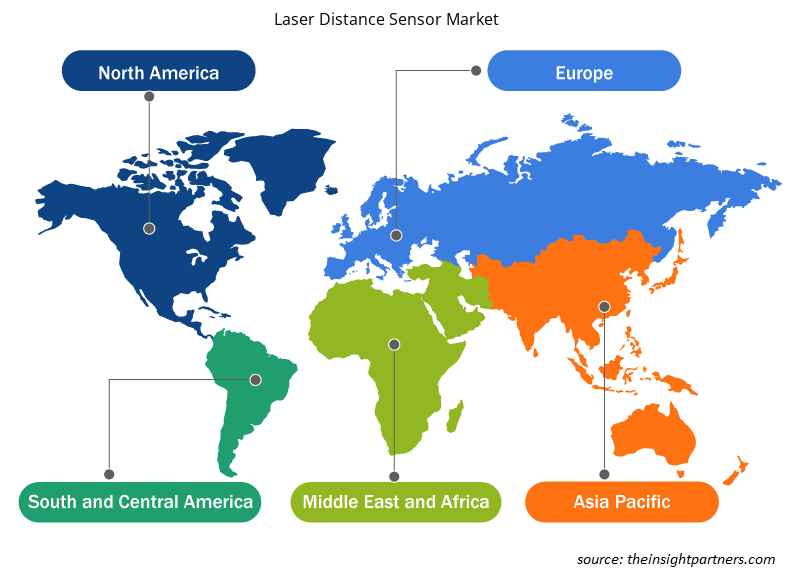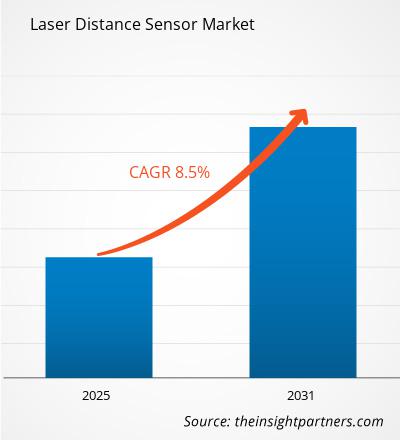2024年,激光测距传感器市场规模为21.4亿美元,预计到2031年将达到37.3亿美元;预计2025年至2031年期间的复合年增长率为8.5%。先进机器人解决方案的出现可能仍将是市场的主要趋势。
激光测距传感器市场分析
政府对制造设施自动化的重视程度不断提升,催生了对激光距离传感器的需求。先进的传感应用有助于提高制造设施的运营效率。因此,政府为推动制造业发展而增加的投资,促进了激光距离传感器市场的增长。此外,汽车行业是激光距离传感器的主要应用领域之一。先进技术在汽车中的集成推动了激光距离传感器市场的发展。
激光测距传感器市场概览
激光距离传感器是一种利用激光束计算物体之间距离的组件。这些传感器可以测量距离,并实现远距离的精确测量。它们的工作原理基于飞行时间 (ToF) 原理,传感器发射激光束并接收其反射。激光束发射和接收之间的时间间隔有助于激光距离传感器确定距离。
定制此报告以满足您的要求
您可以免费定制任何报告,包括本报告的部分内容、国家级分析、Excel 数据包,以及为初创企业和大学提供优惠和折扣
激光距离传感器市场:战略洞察

-
获取此报告的顶级关键市场趋势。此免费样品将包括数据分析,从市场趋势到估计和预测。
激光测距传感器市场驱动因素和机遇
汽车应用对传感器的需求不断增长
随着科技的不断发展,汽车行业也蓬勃发展。车辆依靠有效的传感技术,使自动化系统能够辅助驾驶员,并提供更高的安全性、舒适性和便利性。激光测距传感器广泛应用于自动驾驶汽车,例如定位、障碍物检测以及物体的拾取和放置。该技术有助于检测物体,并提供其在三维空间内的位置和运动信息。此外,它还可以通过检测物体的大小、形状和方向来辅助识别物体。
汽车行业的持续转型催生了对高级驾驶辅助系统 (ADAS) 和激光雷达 (LiDAR) 的需求。随着 ADAS 和 LiDAR 应用对高精度和异构信号冗余度的要求日益提高,激光距离传感器的需求也随之增长。各大汽车制造巨头都专注于 ADAS 和 LiDAR 技术。因此,汽车制造商采用 ADAS 技术催生了对激光距离传感器的需求,以提高车辆高级自动化所需的可靠性,从而进一步推动激光距离传感器市场的增长。LiDAR). With the increasing emphasis on requirements for high levels of accuracy and heterogeneous signal redundancy in ADAS and LiDAR applications, the demand for laser distance sensors is rising. Various automotive manufacturing giants are focusing on ADAS and LiDAR technology. Thus, the adoption of ADAS technology by automakers generates the demand for laser distance sensors to enhance the reliability required for advanced levels of automation in vehicles, which further fuels the laser distance sensor market growth.
政府推动制造设施发展的举措
工业4.0正在改变企业生产、加工和分销产品的方式,并致力于通过最大限度地降低人为失误风险和提供安全的环境来提高产品质量。随着工业4.0应用的兴起,各国政府纷纷加大投资力度,以进一步推动制造业发展。例如,强生公司于2025年3月宣布,未来四年将在美国新增550亿美元的投资,用于制造、研发和技术。此外,“印度制造”和“中国制造2025”等计划正在支持市场参与者扩大生产能力,并采用先进技术来促进产量增长,提高最终产品的效率。工业化的兴起促进了汽车、食品饮料和化工等各个垂直行业新制造设施的建设,进一步推动了对自动化解决方案的需求。激光测距传感器在提供实时、精准的测量方面发挥着至关重要的作用,有助于实现增强型、无误差的制造流程。新建的自动化制造设施将带来对改善质量控制、提高生产率和整体成本效益所需零部件的需求。因此,政府致力于提升制造设施和整合自动化,预计将为激光距离传感器市场的增长创造丰厚的机遇。
激光测距传感器市场报告细分分析
有助于得出激光距离传感器市场分析的关键部分是波长、功率范围和最终用户。
- 根据波长,激光测距传感器市场细分为 200-650 纳米、651-1100 纳米、1101-3000 纳米以及 3001 纳米及以上波长。其中,3001 纳米及以上波长的激光传感器在 2024 年占据了最大的市场份额。
- 根据功率范围,激光测距传感器市场分为小于1 mW、1-100 mW、101 mW 至 500 mW 和 500 mW 以上。2024 年,101 mW 至 500 mW 的功率段占据了最大的市场份额。
- 根据行业垂直细分,市场可分为制造业、建筑业、汽车和机器人、航空航天和国防、地理空间行业、环境监测等。2024年,汽车和机器人领域占据了激光测距传感器最大的市场份额。
激光测距传感器市场份额(按地区)分析
- 激光距离传感器市场分为五大区域:北美、欧洲、亚太地区(APAC)、中东和非洲(MEA)以及南美和中美。2024年,亚太地区占据市场主导地位,其次是北美和欧洲。
- 在亚太地区,印度、中国和日本等国家工业自动化的兴起是推动市场增长的主要因素。工业自动化在制造业、物流业和汽车业等各个领域的广泛应用是激光距离传感器市场的重要驱动力。激光距离传感器在自动化中发挥着至关重要的作用,它提供准确可靠的距离测量,实现精确定位、物体检测和防撞。2024 年 7 月,中国汽车制造商比亚迪在泰国开设了第一家电动汽车工厂,标志着其在东南亚的重大扩张。在这个快速增长的市场中,比亚迪已成为领先企业。在政府补贴和税收优惠的帮助下,中国电动汽车制造商正在泰国建厂,投资额超过 14.4 亿美元,比亚迪工厂就是其中之一。这笔巨额订单凸显了比亚迪致力于利用先进自动化技术和提高制造流程运营效率的承诺。
激光测距传感器市场区域洞察
Insight Partners 的分析师已详尽阐述了预测期内影响激光距离传感器市场的区域趋势和因素。本节还讨论了北美、欧洲、亚太地区、中东和非洲以及南美和中美的激光距离传感器市场细分和地域分布。

- 获取激光距离传感器市场的区域特定数据
激光测距传感器市场报告范围
| 报告属性 | 细节 |
|---|---|
| 2024年的市场规模 | 21.4亿美元 |
| 2031年的市场规模 | 37.3亿美元 |
| 全球复合年增长率(2025-2031) | 8.5% |
| 史料 | 2021-2023 |
| 预测期 | 2025-2031 |
| 涵盖的领域 |
按波长
|
| 覆盖地区和国家 |
北美
|
| 市场领导者和主要公司简介 |
|
激光距离传感器市场参与者密度:了解其对业务动态的影响
激光测距传感器市场正在快速增长,这得益于终端用户需求的不断增长,而这些需求的驱动因素包括消费者偏好的演变、技术进步以及对产品优势的认知度不断提升。随着需求的增长,企业正在扩展产品线,不断创新以满足消费者需求,并抓住新兴趋势,从而进一步推动市场增长。
市场参与者密度是指特定市场或行业内企业或公司的分布情况。它表明特定市场空间内竞争对手(市场参与者)的数量相对于其规模或总市值而言。
激光距离传感器市场的主要公司有:
- 西克股份公司
- ifm 电子有限公司
- 六角AB
- iC-Haus GmbH
- 滨松光子学株式会社
- 劳易测电子有限公司
免责声明:以上列出的公司没有按照任何特定顺序排列。

- 获取激光距离传感器市场主要参与者概览
激光测距传感器市场新闻和最新发展
激光距离传感器市场的评估是通过收集一手和二手研究后的定性和定量数据进行的,这些数据包括重要的公司出版物、协会数据和数据库。以下列出了激光距离传感器市场的一些发展:
- 德国知名传感器和自动化公司ifm Electronic GmbH已扩大其在印尼的业务,助力该国“制造印尼4.0”计划的成功实施。该公司于2022年10月10日成立了其印尼子公司PT ifm electronic Indonesia。随后,ifm Electronic GmbH于2023年8月3日在雅加达Sentral Senayan II举行了盛大的开业典礼,正式启用其办事处。此举彰显了该公司致力于拓展印尼市场并支持该国工业发展事业的决心。(来源:ifm Electronic GmbH,新闻稿,2023年8月)
- 堡盟集团是全球领先的传感器、编码器、测量仪器和自动化成像组件制造商,现已在墨西哥开设新子公司。随着新子公司位于墨西哥圣地亚哥-德克雷塔罗的开业,堡盟的业务现已覆盖全球19个国家,拥有39个研发中心、生产基地和销售部门。
(来源:堡盟集团,新闻稿,2025 年 1 月)
激光距离传感器市场报告覆盖范围和交付成果
“激光距离传感器市场规模和预测(2021-2031)”对以下领域进行了详细的市场分析:
- 激光距离传感器市场规模以及全球、区域和国家层面所有关键细分市场的预测
- 激光距离传感器市场趋势以及市场动态,例如驱动因素、限制因素和关键机遇
- 详细的 PEST 和 SWOT 分析
- 激光距离传感器市场分析涵盖主要市场趋势、全球和区域框架、主要参与者、法规和最新市场发展
- 行业格局和竞争分析,包括市场集中度、热图分析、知名参与者以及激光距离传感器市场的最新发展
- 详细的公司简介
- 历史分析(2 年)、基准年、预测(7 年)及复合年增长率
- PEST和SWOT分析
- 市场规模、价值/数量 - 全球、区域、国家
- 行业和竞争格局
- Excel 数据集
近期报告
相关报告
客户评价
购买理由
- 明智的决策
- 了解市场动态
- 竞争分析
- 客户洞察
- 市场预测
- 风险规避
- 战略规划
- 投资论证
- 识别新兴市场
- 优化营销策略
- 提升运营效率
- 顺应监管趋势






















 获取免费样品 - 激光测距传感器市场
获取免费样品 - 激光测距传感器市场